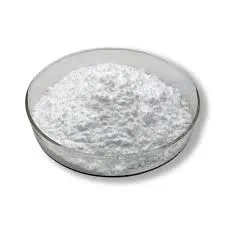
Sep . 23, 2024 18:42 Back to list
Hydroxyethyl Cellulose Available for Purchase in Various Quantities and Specifications
Hydroxyethyl Cellulose for Sale An Overview and Considerations
Hydroxyethyl cellulose (HEC) is a water-soluble polymer derived from cellulose. Recognized for its versatility and beneficial properties, HEC has become increasingly popular across various industries, including pharmaceuticals, cosmetics, food, and construction. This article delves into the characteristics, applications, and market considerations for hydroxyethyl cellulose, particularly focusing on the product's availability for sale.
What is Hydroxyethyl Cellulose?
Hydroxyethyl cellulose is produced through the etherification of cellulose, which is sourced from natural plants. The process involves replacing a portion of the hydroxyl groups in cellulose with hydroxyethyl groups, imparting unique properties to the cellulose molecule. HEC is non-ionic, which means that it does not carry a charge, making it chemically stable and compatible with a wide range of substances.
Properties of Hydroxyethyl Cellulose
HEC possesses several remarkable characteristics that make it a preferred choice for numerous applications
1. Thickening Agent HEC is an effective thickening agent and is often used to increase the viscosity of liquid formulations. This property is valuable in various sectors, ensuring proper consistency and application.
2. Film-Forming Ability One of the standout features of hydroxyethyl cellulose is its film-forming capability. When applied to surfaces, HEC can create a smooth, protective layer that enhances the overall performance of the product.
3. Water Retention HEC has excellent water retention properties, which makes it an ideal ingredient in products like creams and lotions, ensuring prolonged hydration and softness.
4. Stability Being resistant to changes in temperature and pH, hydroxyethyl cellulose can maintain its properties under varying conditions, making it suitable for products that might experience such fluctuations.
Applications of Hydroxyethyl Cellulose
The diverse properties of hydroxyethyl cellulose translate into numerous applications across different sectors
hydroxyethyl cellulose for sale

1. Pharmaceuticals HEC is commonly used in drug formulations as a binder, film-coating agent, and suspending agent. Its ability to improve the viscosity and stability of liquid medications enhances drug delivery systems.
2. Cosmetics and Personal Care In cosmetics, HEC is utilized in lotions, creams, shampoos, and conditioners. Its thickening and moisturizing properties enrich formulation stability and performance, improving the customer experience.
3. Food Industry HEC serves as a food additive, functioning as a thickener and stabilizer in products like sauces, dressings, and dairy items. Its safety as a food-grade ingredient makes it an appealing choice for food manufacturers.
4. Construction In construction materials, hydroxyethyl cellulose is used to improve the workability and adhesion of cement and plaster products. Its water retention capabilities help in the curing process, enhancing the integrity of the final product.
Market Considerations and Availability
With the wide range of applications and benefits of hydroxyethyl cellulose, the market demand has grown significantly. When looking for HEC for sale, there are several factors to consider
1. Purity and Quality It is crucial to assess the purity of the HEC products available. High-quality HEC will have more consistent properties and better performance in formulations.
2. Supplier Reputation Choosing reputable suppliers is essential to ensure the quality and reliability of HEC. Researching suppliers and reading customer reviews can provide insights into their reliability.
3. Cost and Availability Prices for hydroxyethyl cellulose can vary based on purity, quantity, and supplier. Exploring multiple sources and considering bulk purchasing can help mitigate costs while ensuring necessary supply.
4. Customization Different applications may require specific grades of HEC, customized to meet unique formulating requirements. Engaging with suppliers who offer customizable options can help achieve the desired formulation characteristics.
Conclusion
Hydroxyethyl cellulose is a remarkable substance with extensive uses across numerous industries. Its beneficial properties make it an essential ingredient in pharmaceuticals, cosmetics, food products, and construction materials. As demand continues to rise, understanding the characteristics, applications, and market considerations is crucial for individuals or companies looking to purchase HEC. By choosing high-quality products from reputable suppliers, businesses can harness the full potential of hydroxyethyl cellulose in their formulations, enhancing product efficacy and consumer satisfaction.
-
The Widespread Application of Redispersible Powder in Construction and Building Materials
NewsMay.16,2025
-
The Widespread Application of Hpmc in the Detergent Industry
NewsMay.16,2025
-
The Main Applications of Hydroxyethyl Cellulose in Paints and Coatings
NewsMay.16,2025
-
Mortar Bonding Agent: the Key to Enhancing the Adhesion Between New and Old Mortar Layers and Between Mortar and Different Substrates
NewsMay.16,2025
-
HPMC: Application as a thickener and excipient
NewsMay.16,2025
-
Hec Cellulose Cellulose: Multi functional dispersants and high-efficiency thickeners
NewsMay.16,2025







